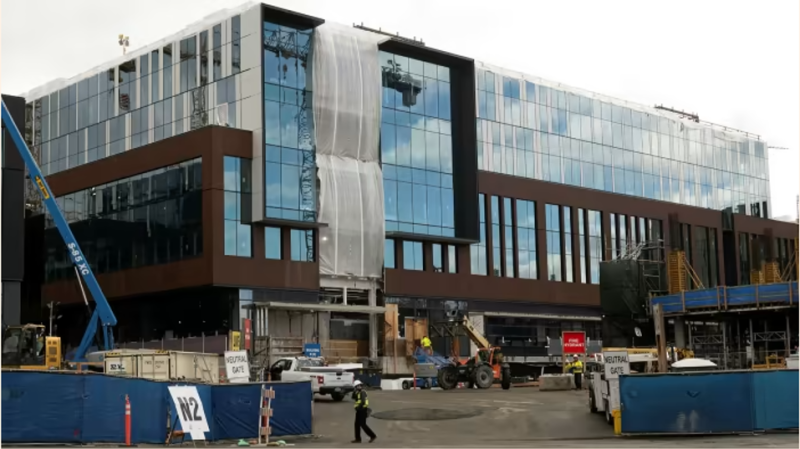If you would like to receive weekly updates like this, sign up here.
By the time you read this the latest Boom Bust Bulletin (BBB) edition will have been sent to members.
I won’t spoil too much about what was in that edition. That is for paying members.
However, I will say this.
In this edition I wrote about the fortunes of the so-called “Big Five” tech companies in the United States.
There are: Apple, Microsoft, Google, Amazon, and Meta (formerly Facebook).
Now, you may have noticed recently the many media stories about the pressures each of these companies stock prices are under.
In fact, some ‘experts’ are saying that the fall in their stock prices is proof that the US stock market was in bubble and it is now bursting.
I set the record straight in the most recent edition of the BBB.
I won’t go into detail about it here.
But my ability to see through the noise demonstrates, yet again, the incredible advantage being able to see the economy through the lens of the 18.6-year Real Estate Cycle.
In this week’s post, I will show you today something I’ll bet you’ve never heard about any of the Big Five to date.
If you hold a large position in these companies, or indeed might wish to, then this is one of the most important things you’ll read about them this year.
How to capitalize on all that money.
You don’t need me to tell you just how important these five companies are to a modern technologically advanced economy.
Their combined revenue currently stands at $1.4 trillion. This is what they generate in sales every year and this growing every year.
So, they aren’t going broke anytime soon, regardless of share price action.
However, there is one thing that these companies are doing, very quietly and with little fanfare, that isn’t really being reported on.
Or, on the odd chance this news does garner some attention, those reporting on it don’t fully grasp its importance.
You see, what we hear every day is just how each intend to move their business and therefore their ecosystems, fully online. This is often touted as proof of a seismic shift towards the metaverse.
However, I urge you to start following the money to see what they are actually doing.

Source: FT
Above is a photo of a construction site in Redmond, Washington on the west cost of the USA. This is part of the Microsoft campus there.
How many of you realized how big a landlord Microsoft is?
You need to know this now. It’s particularly important.
The tech behemoths are staking their future not in the cloud, but on the ground.
Staying on Microsoft, they reported back in February their cloud revenue had jumped 32%. New bookings in the cloud business also came in stronger than anticipated, climbing 37%.
This, claim the experts, shows the reasons why Microsoft’s future is online, as there’s so much money in it.
And that’s true. It’s certainly a very lucrative business to be doing.
But Microsoft also reported something else, and either everyone missed it or quickly forgot it.
They reported that the total amount of leased and owned office space, data centers and warehouses was 67 million square feet in 2021.
That’s astonishing. A huge additional income stream for the company and a fitting example of how to correctly use profits from other legs of the business.
Is Microsoft the only one?
Actually, no. The following is from a recent Financial Times article on the subject (my emphasis):
Amazon is betting on a return to offices by expanding from its Seattle headquarters to the suburb of Bellevue with a 3.5-acre site. But this does not cover most of the ecommerce company’s land use. In the last set of annual reports, Amazon listed its global properties as close to 35mn sq ft, plus another 570mn sq ft in leased space.
It values its land and buildings at $81bn, up from $32bn at the end of 2018. The majority are warehouses and data centers that power its cloud computing business and reduce ecommerce delivery times.
Amazing; so not only does Amazon create huge revenues through its AWS (Amazon Web Services) in the cloud, but as those gains manifest it buys its own data centers to run AWS and allows the land to eventually capture those same gains.
Do you think they might understand the real estate cycle themselves?
Right before your eyes, and with little fanfare, Amazon is becoming one of the biggest landowners in the US.
Meta (formerly Facebook) has seen its share price hit by hammer blow after hammer blow. These are due to company and taxation issues specific to them.
However, I reckon that whilst the share price has nosedived, there is solid fundamentals too which should mean a certain level of insulation from further pressure.
How come? Meta recently added its Menlo Park campus to its ever-expanding data centers across the globe. It reported its total land holdings at $21 billion at the end of 2021, up from $8 billion in 2018.
A change in mindset that could be worth millions to you.
Like every other listed company, the past 12 months have not been kind to shareholders of large, publicly listed companies.
The Big Five are no different.
However, since the March 2020 market bottom these same companies made astronomical profits. And this is on top of what they’ve done in the last decade.
Now some companies have used these piles of cash as dividends to attract investors or have indulged in some shares buy-backs to support existing shareholders.
But the smartest use of those funds is what Microsoft and its peers are doing.
So, I ask you, who do you think is right?
Is it the media who continually report about economic uncertainty, real estate prices dramatically falling as developed countries enter a new era of interest rate hikes.
Or do you follow the smart money? Do you believe that Microsoft and Amazon business plan to anchor themselves to real estate now will eventually pay off?
For mine, the history of the 18.6-year Real Estate Cycle is unequivocal: those buying and investing in the land market now will reap enormous windfalls later this decade.
So, if you’re a shareholder of the likes of Microsoft you are extremely well positioned now thanks to the decisions being made today by these companies.
In fact, its plausible the best performing US tech stock companies by the end of this decade will be the biggest landowners. And my research is telling me there is only a handful with the foresight of Amazon and others that qualify.
But that cuts both ways. It’s highly likely the best time to sell out of these companies is right when the US land markets peak then fall. But you won’t be hearing that from the media.
It’s time to change your mindset when looking at tech companies to invest in.
Don’t look for the next big trend in tech anymore, look for the largest landholders amongst them instead.
Use the timing inherent in the real estate cycle and nail your entry and most importantly your exit. Invest with the cycle, never against it.
And this is where you learn that timing, with a membership to the Boom Bust Bulletin.
It will teach you the history of the 18.6-year Real Estate Cycle, why it continues to repeat to this day, and the unique opportunities that this study can uncover for you and your family.
The greatest boom in human history has begun. And its intrinsically linked with the land market. All the way up, then all the way down too.
The secret to big profits in big tech is in the land. You just need the timing now.
And the Boom Bust Bulletin is where you’ll find it.
Best wishes,

Darren J Wilson
and your Property Sharemarket Economics Team
P.S. – If you would like to receive weekly updates like this, sign up here.
P.P.S – Find us on Twitter here and go to our Facebook page here.
This content is not personal or general advice. If you are in doubt as to how to apply or even should be applying the content in this document to your own personal situation, we recommend you seek professional financial advice. Feel free to forward this email to any other person whom you think should read it.



